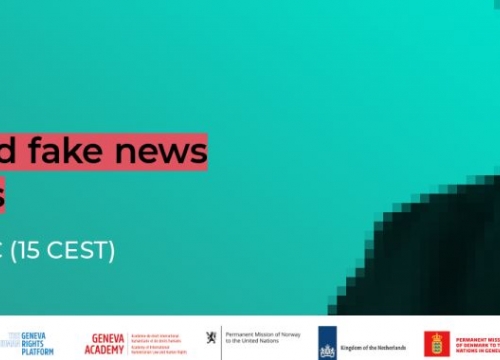Right On: Fighting Online Hate Speech and Fake News in a Global Crisis
Right On


Geneva Internet Platform
Content challenges such as fake news, disinformation campaigns, and online hate speech are increasingly common these days. These challenges are far from recent developments; the outbreak of the coronavirus has only accelerated this ‘infodemic’, while the growth in online acts of hate speech – in particular towards Asian people – have contributed to the ‘coronaracism’ phenomenon.
In order to curb down the spread of false information, xenophobia, and online intolerance, governments worldwide have or are taking steps to enact legislation which sanctions such conduct. The private sector, led by tech giants Facebook, Google, Twitter, and Apple, has also taken the initiative to help fight some of the most pervasive challenges of the digital era.
Our Wednesday webchat ‘Right On’ will discuss these prevailing issues and how they affect us – particularly during a crisis, as well as what lessons we can draw from our experience in attempting to effectively address fake news and online hate speech.
Moderators
- Jovan Kurbalija, Founding Director, DiploFoundation and Head, Geneva Internet Platform
- Marc Limon, Executive Director, URG
Speakers
- Andrew Fagan, Director, Human Rights Centre at the University of Essex
- Mona Rishmawi, Chief of the Rule of Law, Equality and Non-Discrimination Branch, Office of the UN High Commissioner for Human Rights
- Bahia Tahzib-Lie, Human Rights Ambassador, Ministry of Foreign Affairs of the Kingdom of the Netherlands
Registration
To join the discussion, you need to register here.
‘Right On’: The Wednesday Web Chat
‘Right On’ is a new digital initiative – co-organized by the Geneva Academy, the Geneva Human Rights Platform, the Geneva Internet Platform, the DiploFoundation, the Universal Right Group, the Human Rights Centre at the University of Essex, as well as the Permanent Missions of Denmark, Norway and the Netherlands to the United Nations in Geneva – that will keep the human rights dialogue going during these COVID-19 times.
Every Wednesday at 15:00, experts and practitioners will discuss key human rights issues related to the current health crisis.
Video
Right On: Fighting Online Hate Speech and Fake News in a Global Crisis
In this first event of the ‘Right On’ digital initiative, panelists discussed online hatespeech and fakenews, notably in the context of the current global crisis.











